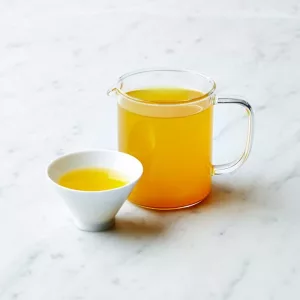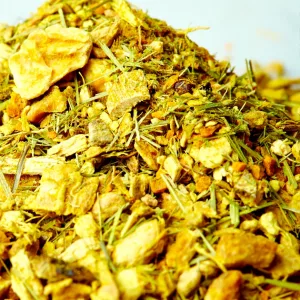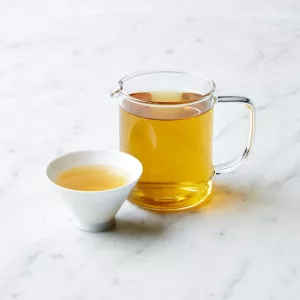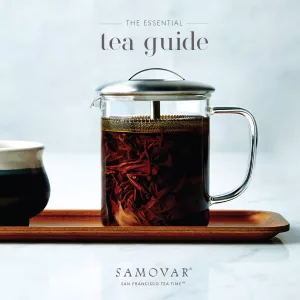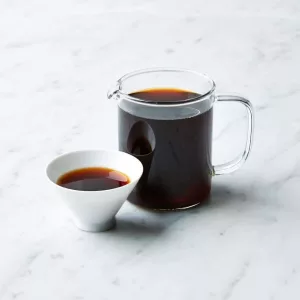
When I’m traveling and I tell people what I do, they often roll their eyes and say, “A tea lounge? Only in San Francisco!”
Now we have three Tea Lounges plus an online shop, but the truth is, Samovar almost never happened — even in San Francisco.
Of the banks that made time to meet, more than seventy rejected the business plan. Even number seventy-two, the bank that finally gave us a break, thought we would fail. “Honestly,” the loan officer said. “All the data says your concept will fail. But this is a place that I want to exist because I want to go there! With that, I’m going to approve it.” (Thank you for believing, Mr. Decius!)
Start With a Personal Mission Statement
A daily visualization practice is one tool that gave me strength in the early days, and that I continue to practice. Another essential tool is having a clear personal mission statement backed up by explicit core values.
I’m not talking about, “Increasing shareholder value by blah, blah, blah.” I’m talking about having a reason to get up in the morning. I’m talking about spending your life doing work that resonates within your core.
Before starting Samovar I worked for a corporate consulting company.
One afternoon on assignment in Seattle, it hit me. The office hummed with the buzz and flicker of fluorescent lights, and the muffled voices mingling over cubicle walls. I looked out the window to the office park trees barely visible in the gray and steady drizzle.
I had a secure job with a career path and retirement plan. My dreams of freedom might come true at some distant point, but my present was hollow.
I was sipping a good Tieguanyin oolong from a friend in Taiwan, and as I stared into my styrofoam cup watching the steam swirl up I realized what I craved most: real human connection.
I knew my purpose wasn’t to live out my days in a cube. It was something bigger. In that moment, Samovar was born: The idea of using to tea create a new daily habit for people to connect, to be present, and to live richer lives. Tea was the way.
The Core Values: A Compass And A Beacon
There’s no way to put a timeline on finding your mission. But to figure it out you need to get present. Pick your path: Martial arts, meditation, running, taking a cold shower; make time for single-minded focus every day.
After you have a glimmer of your mission, you need a compass to figure out whether or not you are on track to fulfilling that purpose. That compass is your set of values.
Since opening over ten years ago, our mission hasn’t changed: creating positive human connection. Every quarter, all of our leaders escape to the woods to discuss our values and determine if we are on track or not, and what we can do about it.
Our values come from deep discussions on how we want to change the world and what we believe is important in our lives and the lives of our customers.
For every decision we make, what tea to buy, who to hire, or who to let go, our values guide us.
So here they are, The Samovar Core Values, 2013.
The Samovar Core Values
Our values are the rudder that guides us and the beacon that attracts staff and customers.
Note: Our values may be rooted in Eastern philosophy and the Japanese the tea tradition but they encompass very modern realities and capture how we see the world.
1. Wabi-sabi: authentic & inviting
The Velveteen Rabbit, your favorite pair of faded jeans, a piece of rustic handmade pottery, a forest path covered in fallen autumn leaves, all embrace Wabi-sabi: the Japanese principle of the beauty of the “imperfect, impermanent, and incomplete”.[1]
At Samovar we embrace the idea that “nothing lasts forever, nothing is finished and nothing is perfect”.[2] Our goal is to create a nurturing environment where everyone’s inner wabi-sabi shines through.
2. Shibumi: effortless perfection
The essence of Shibumi is embodied in the gold medalist diver and elite ballerina; they make it look so easy and yet countless hours of blood, sweat and tears went into making their art what it is.
We strive for harmony and effortless perfection in everything we do at Samovar which ultimately means radical awareness in what we do and awesome teamwork.
The word Shibumi was first used in around 1336 in Japan. By the Edo period (1615-1868) it evolved to its modern meaning: grace and ease in excellence–without showiness or gaudiness.
3. Shinrin-yoku-cha: nature-bathing
Every week the modern American spends 19.6 hours watching TV and 23 hours on email, text and social.[3,4] All this time has to come from somewhere, so what are we giving up?
The true cost of being “always-on” can sneak up on you. What starts as feeling hyper-productive and hyper-connected is actually addiction with real consequences.
New Economy Depression Syndrome (NEDS) is a clinical syndrome associated with information overload, and results in anxiety, exhaustion, burnout, decision paralysis, sadness, irritability, and sleep problems.[5]
One counterforce is Shinrin-yoku, nature-bathing. When you nature bathe, you connect with nature physically and emotionally. This has been proven with science to reduce stress and improve memory and your immune system.[6]
At Samovar, we coined the term Shinrin-yoku-cha to describe nature-bathing through drinking tea (“cha” means tea). Literally inhaling the aroma of jasmine tea can improve your mood, reduce stress and lower blood pressure.[7] Think about that the next time you reach for a latte.
We can’t take you into the woods, but we can bring nature to you in a pot of green tea.
4. Ikigai: zest for life
Ikigai is our reason for being. It is the fire that wakes us up in the morning.
Our job in life is to find our own personal ikigai, our reason for being, and to wake up every day and fulfill that mission.
Tea helps us find our ikigai because tea makes us healthy, focused, relaxed and happy.
5. Ichi-go Ichi-e: one chance, one encounter
This is it, this is all we’ve got. Just one life. So, how do we make the most of it?
We live every single day, knowing that it will never come again. That all we have is this moment.
Ichi-go Ichi-e harks directly from Chado–the Zen way of tea–and it is written on the walls of tea rooms across the world. It means this: When we sit down for tea, alone or with another, all we have is this one, this single chance meeting. It has never existed before. It will never exist again. So let’s be fully present to it.
Drinking tea in this manner improves our awareness and leads to more mindfulness in every facet of life. After all, we only get good at what we practice.
How To Discover Your Core Values
Mindfulness. The first step is to practice mindfulness through any means necessary. And that means turning off distraction.
Gather. Gather all the stakeholders in one room. If it’s your personal core values, that’s just you. If it’s your company, get your leadership team together. Find a retreat space out of the home or office, free from associations with day to day stress. Bring large format post-it notes or a whiteboard.
People. Start the question: Who are the people we respect and admire the most? Whether it’s historical figures, political leaders, artists, entrepreneurs, friends or family, write their names so everyone can see.
Attributes. Next, answer the question, What qualities attract us to these people? Why are they on the list? Jot down the attributes. Think big.
Refine. Remove duplicate qualities and evaluate your list. Boil it down to between 3 and 5 values total. You can’t have more than 5. These are your core values.
Share. Share your list with everyone relevant, whether its just yourself, your family or your whole company.
Live. The values should be a part of your daily life or your work. Measure any challenging situation that arises against the appropriate value. If it’s a good value it will help you navigate this challenge. If not, you need tighter values.
With gratitude,
Jesse Jacobs
P.S. Tomorrow night, November 7, you can taste our values at an exclusive tea dinner. Tickets are $100. Space is limited. Learn more & reserve your seat –>
P.P.S. Next Wednesday, November 13, I’m hosting Ido Leffler–a wildly successful entrepreneur and good friend–for an evening of tea and talk. Since 2006, Ido and his team have built Yes To™ into one of the world’s leading natural beauty brands, with distribution in over 26,000 stores in 25 countries. Join us live for tea and conversation while we learn how he built his values-based company and discuss his fresh-off-the-press book Get Big Fast & Do More Good. Learn more –>
References
Koren, Leonard (1994). Wabi-Sabi for Artists, Designers, Poets and Philosophers. Stone Bridge Press.ISBN 1-880656-12-4.
Powell, Richard R. (2004). Wabi Sabi Simple. Adams Media. ISBN 1-59337-178-0.
- http://www.ncbi.nlm.nih.gov/pubmed/15976995

